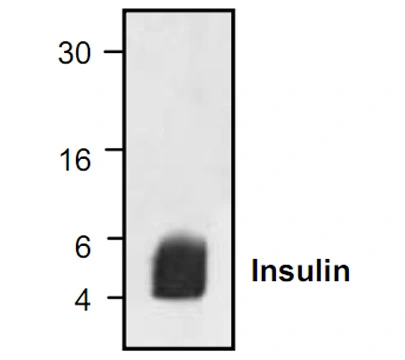Insulin antibody [K36AC10]
GTX26995
ApplicationsDot Blot, Flow Cytometry, ELISA, ImmunoHistoChemistry, ImmunoHistoChemistry Paraffin, RadioImmunoAssay
Product group Antibodies
TargetINS
Overview
- SupplierGeneTex
- Product NameInsulin antibody [K36AC10]
- Delivery Days Customer9
- Application Supplier NoteIHC-P: 1:1,000. *Optimal dilutions/concentrations should be determined by the researcher.Not tested in other applications.
- ApplicationsDot Blot, Flow Cytometry, ELISA, ImmunoHistoChemistry, ImmunoHistoChemistry Paraffin, RadioImmunoAssay
- CertificationResearch Use Only
- ClonalityMonoclonal
- Clone IDK36AC10
- ConjugateUnconjugated
- Gene ID3630
- Target nameINS
- Target descriptioninsulin
- Target synonymsIDDM, IDDM1, IDDM2, ILPR, IRDN, MODY10, PNDM4, insulin, preproinsulin, proinsulin
- HostMouse
- IsotypeIgG1
- Protein IDP01308
- Protein NameInsulin
- Scientific DescriptionMonoclonal Anti-Insulin may be used for the localization of insulin using RIA, dot blot and immunocytochemistry. Insulin is one of the major regulatory hormones of intermediate metabolism throughout the body. The biological actions of this hormone involve integration of carbohydrate, protein, and lipid metabolism. Insulin enhances membrane transport of glucose, amino acids, and certain ions. It also promotes glycogen storage, formation of triglycerides and synthesis of proteins and nucleic acids. Immunocytochemical investigations have localized insulin in the B or b-cells of pancreatic islets of Langerhans. Deficiency of insulin results in diabetes mellitus, one of the leading causes of morbidity and mortality in the general population. Insulin is also present in tumors of b-cell origin such as insulinoma. Insulin-specific antibodies prove useful as b-cell and tumor markers using immunohistochemical techniques, and as analytical tools in quantification of the hormone.
- Storage Instruction-20°C or -80°C,2°C to 8°C
- UNSPSC12352203

